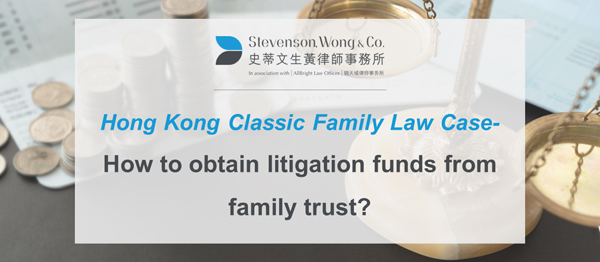We acted for the Petitioner (“the Wife”) in the Hong Kong High Court case KCMA v ABC and others [2020] HKCFI 848. The Wife obtained litigation funds of HK$1,500,000 from the Family Trust.

Background
This was a high conflict case. It involved a lot of legal issues, including but not limited to two applications under section 17 of the Matrimonial Proceedings and Property Ordinance, Cap 192 (“MPPO”) (relating to avoidance of transaction intended to defeat certain claims) and other ownership/trust issues.
In the present case, the Wife sought periodical payments to be applied towards her litigation funding from the Husband, or alternatively the Husband to cause distribution from the Family Trust, which was estimated by the Husband at HK$98,000,000. Both the Husband and the Wife were the beneficiaries of the Family Trust.

Legal Principles
The Court pointed out in its judgment that it has the power to include an element for legal costs provision in an order for maintenance pending suit under the MPPO. The Court cited the recent case WW and LLN [2020] HKCA 178, CACV 524/2019:
“The principles for granting litigation funding are well-established:
- In order to obtain litigation funding, the burden is on an applicant to demonstrate that she cannot reasonably procure legal representation by any other means. […] To the extent that she has assets, the applicant has to demonstrate that they cannot reasonably be deployed, either directly or as the means of raising a loan to fund legal services …
- The subject matter of the proceedings and the reasonableness of the applicant’s stance in the proceedings will always be relevant.
- The period over which costs allowance is to be paid is also relevant. If the application was made before the Financial Dispute Resolution (“FDR”) hearing, it may well be wise to order that the costs allowance should fund the applicant only up to that hearing. If the FDR fails, it would be for the new judge, on the basis of the materials properly before him, to determine whether a new allowance for legal costs should be granted and if so, in what amount.
The court should be alert to the risk of injustice arising from irrecoverable and/or unmerited sums paid for litigation funding, which would call for extra caution in the balancing exercise.
‘… the whole purpose of alimony pending suit is to sustain the petitioner pending the court’s determination. There is manifestly a risk of unjustified and irrecoverable payments, but that has to be balanced against the risk of a denial of access to justice for the petitioner, if she has not the means to sustain herself and the litigation pending its determination.'”

Court’s Decision
The Means of the Wife and the Husband
On the basis of the facts of the case and the abovementioned legal principles, the Court made the following findings in relation to the means of the Wife and the Husband:-
The Wife’s means – The Wife alleged that, during her 15 years marriage to the Husband, she was, and still is, a homemaker, and financially dependent on the Husband. She did not hold any assets of value. The Court was satisfied that the Wife did not have sufficient asset held in her name which can reasonably be deployed. Although there was no evidence that she had made any application for legal aid, given that she had received MPS and other financial resources from the Family Trust, the Wife would not have met the means test required to be passed when making an application for legal aid.
The Husband’s means – The Husband alleged that since he was unable to obtain any distribution from the Family Trust, he could not afford to pay the litigation funds sought by the Wife, nor his own legal costs.
The Court adopted a broad brush approach in considering the means of the parties, and came to the conclusion that there was no sufficient evidence to show that the Husband would be able to pay the Wife’s and his own litigation costs without receiving any distribution from the Family Trust.
The Family Trust
The Court then made findings on the distribution from the Family Trust. The Court pointed out that, in their letter correspondence, the solicitors for the parties have already suggested to use the distribution from the Family Trust as litigation funds for the Wife.
The Court was of the view that, given both parties were the beneficiaries, they could not cause any distribution of the Family Trust as this is within the discretion of the Trustee, but the Wife or the Husband could have simply agreed to the Joint Request for distribution from the Family Trust on a without prejudice basis.

Conclusion
During divorce proceedings, if one (e.g. the Wife in this case) does not have sufficient financial resources, but at the same time has to bear living expenses, children’s maintenance and litigation costs, one should carefully consider obtaining financial support (e.g. distribution from Family Trust in the present case despite the live issues arising from the settlement) in order to maintain a living and support the conduct of the legal proceedings.
This article is co-authored by our experienced Private Client Team – our Partners Catherine Por and Wendy Lam, and our Senior Associates Karl Wong and Calvin Lo. Please contact our Catherine Por or Wendy Lam for any further enquiries or information.
This newsletter is for information purposes only. Its content does not constitute legal advice and should not be treated as such. Stevenson, Wong & Co. will not be liable to you in respect of any special, indirect or consequential loss or damage.
